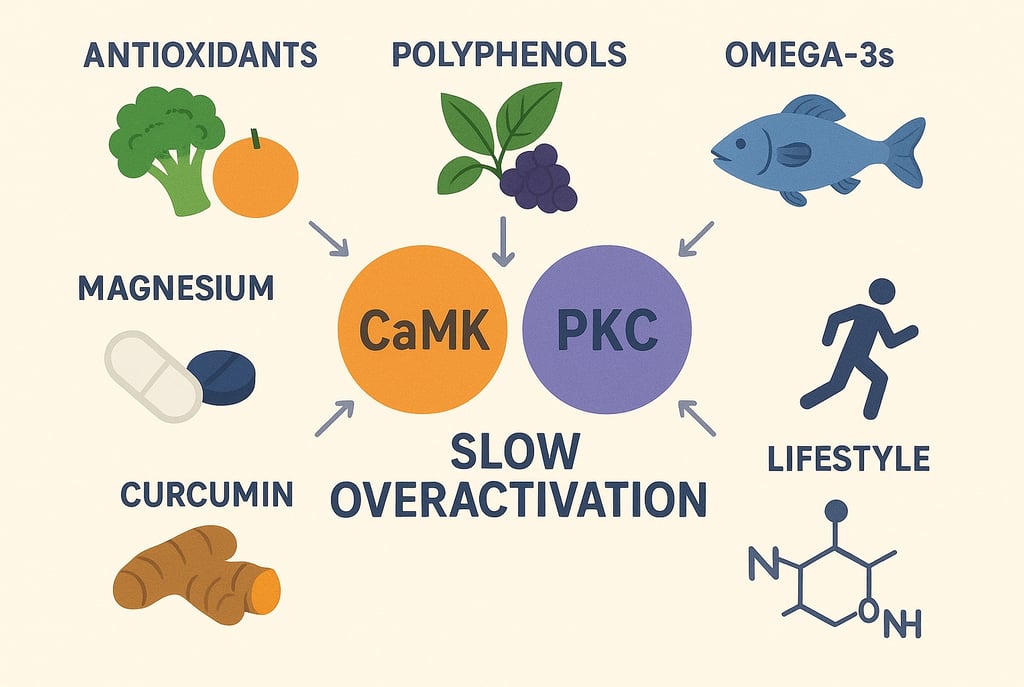"Uncover the truth behind the groundbreaking discovery of the causes of the world's biggest problems. 'The Root Causes' will change how you view the world!"
Protecting Your Health: Preventing Overactivation of CaMK and PKC
CaMK and PKC are essential “stress switches” inside your cells that help them respond to changes in calcium and stress signals. When these switches stay overactive for too long, they can contribute to heart problems, brain degeneration, diabetes complications, cancer, and chronic inflammation. You can support healthy kinase activity naturally through antioxidants, polyphenols like turmeric and resveratrol, omega-3 fatty acids, and minerals such as magnesium. Lifestyle habits like regular exercise, stress management, and eating a balanced diet help keep these switches in check. By combining nutrition and lifestyle strategies, you can reduce chronic cellular stress and protect your long-term health. 30 Hashtags: #CaMK #PKC #CellHealth #CellularWellness #StressResponse #HeartHealth #BrainHealth #Neuroprotection #DiabetesSupport #AntiInflammatory #CancerPrevention #HealthyCells #OxidativeStress #Antioxidants #Polyphenols #Curcumin #Resveratrol #Omega3 #Magnesium #NAC #LifestyleMedicine #StressManagement #ExerciseForHealth #HealthyDiet #PreventDisease #MetabolicHealth #WellnessTips #FunctionalHealth #CellularBalance #ChronicInflammation #NaturalHealth
Glenn Rosaroso Vale, MT(AMT), MS(IT), MBA
10/8/20252 min read


How to Prevent Overactivation of CaMK and PKC – Protect Your Cells and Your Health
Inside every cell in your body are tiny “switches” called CaMK and PKC. These switches help your cells respond to stress, like changes in calcium, inflammation, or oxidative damage. Normally, they keep your cells working properly, but if they stay turned on for too long, they can actually damage your body and contribute to serious diseases.
Why Overactive CaMK and PKC Are a Problem
When these switches are constantly active, they can create problems in many parts of the body:
Heart problems: irregular heartbeat, stiff or damaged blood vessels.
Brain issues: nerve cell damage, memory problems, risk of Alzheimer’s or Parkinson’s.
Diabetes and metabolism: blood sugar problems, insulin resistance, damaged blood vessels.
Cancer: these switches can help abnormal cells survive and grow.
Chronic inflammation: ongoing irritation in your tissues and organs.
Think of it like leaving a stove burner on all day—it eventually causes damage.
How to Keep These Switches Balanced
The good news is you don’t need drugs to control them. You can support your cells naturally with food, supplements, and lifestyle choices:
1. Antioxidants
Substances like glutathione or NAC (N-acetylcysteine) help reduce stress in your cells and prevent overactivation.
2. Plant Compounds
Curcumin (turmeric), resveratrol (berries and grapes), and quercetin (apples, onions, leafy greens) can calm these switches.
3. Healthy Fats
Omega-3 fatty acids (from fish or supplements) keep cell membranes healthy and prevent overreaction.
4. Minerals
Magnesium helps keep calcium signals in check, which prevents CaMK from being constantly “on.”
5. Lifestyle Choices
Exercise helps your cells handle stress better.
Manage stress with meditation, deep breathing, or yoga to prevent PKC overactivation.
Eat a balanced diet, avoid too much sugar or processed foods, and focus on anti-inflammatory foods.
Key Takeaway
CaMK and PKC are your cells’ natural “stress switches.” If left overactive, they can contribute to heart disease, brain problems, diabetes, cancer, and inflammation. By eating the right foods, taking supportive nutrients, and managing stress, you can keep these switches balanced and protect your health for the long term.
Simple Steps to Start Today:
Add turmeric, berries, leafy greens, and apples to your diet.
Eat fatty fish or take an omega-3 supplement.
Include magnesium-rich foods like spinach, avocado, or pumpkin seeds.
Move your body daily and practice stress-relief techniques.
Consider NAC or sulfur-rich foods (garlic, onions, eggs) to support antioxidants.
Even small daily changes can help keep your cells healthy and reduce long-term disease risk.
Health
Understanding illness to empower your well-being journey.
Wellness
Knowledge
info@rootcauseprevention.com
903-268-6664
© 2024. All rights reserved.
grfv@sbcgloal.net